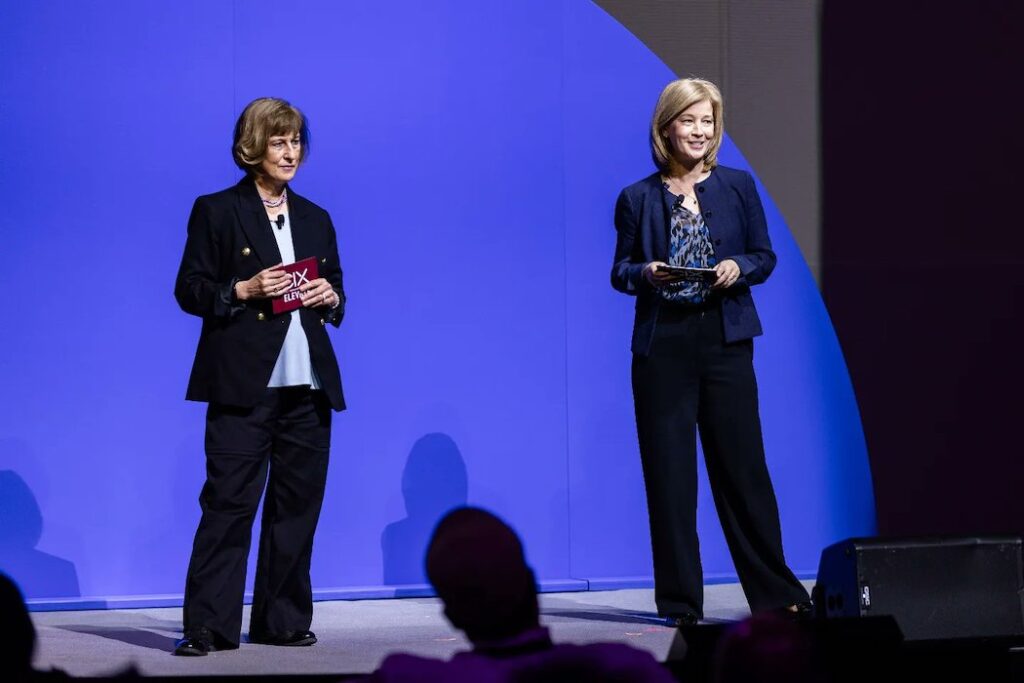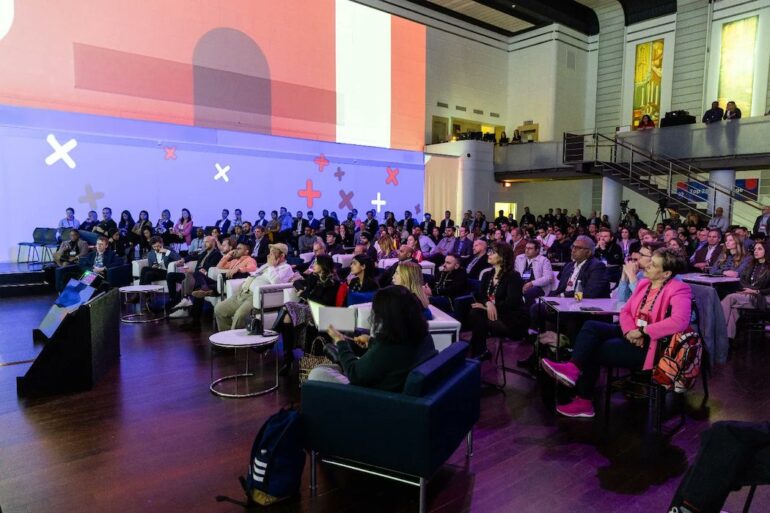Toronto’s Design Exchange was abuzz last week with the launch of CIX Summit 2024, which convened founders, investors, and industry advisors to showcase promising startups and spark new conversations about what’s next in tech.
CIX, held on March 26 and 27 and powered by Elevate, which acquired the conference last year, featured a curation of startup presentations, keynotes, and panels, as well as meeting exchanges with investors and networking opportunities to accelerate Canadian deals.
“If you get consensus, you’re not going to get outliers, and the venture business is about outliers.”
The summit’s opening night featured several heavy hitters, starting with OMERS Ventures’ Laura Lenz and MaRS CEO Alison Nankivell, both CIX co-chairs, who discussed the state of the Canadian venture. Following their opening remarks, the CIX Innovator of The Year award was given to Aidan Gomez, CEO of Toronto-based Cohere.
Gomez joined Inovia Capital’s Kory Jeffrey and KPMG Canada’s Seamus Blackmore for a discussion on the growth of Cohere and the future of artificial intelligence (AI). During the fireside chat, Gomez laid out the specific attributes that make Cohere different.
The Toronto-based startup is backed by players like Nvidia and Oracle, and is currently in talks to raise more than $500 million from investors including Canadian pension fund PSP Investments, according to a report last week from The Information.
However, Gomez said Cohere has not yet taken a massive investment from a large cloud player, where “money comes off balance sheet, goes into the company, and then goes right back in as cloud revenue.”
He said this has made fundraising harder for the startup, as it focuses on going to institutional and strategic investors that have an interest in using Cohere’s product. “It’s a tougher fight, but it’s better for the customer. It lets us preserve our independence, we don’t get locked into one ecosystem,” he said.
Gomez believes his startup’s second major differentiator lies in its focus on enterprises, rather than consumers. “That focus lets us really prioritize the types of use cases that we’re going to tackle and get very good at,” he added.
He explained that, in contrast to ChatGPT, which experienced swift uptake from consumers over the past year, AI adoption within enterprises is progressing more slowly, partly due to the need for extensive upskilling and a reconsideration of the buying process. “I think there’s going to be another two or three years of integration, like actually getting this technology into products into the hands of employees to speed them up and make them more productive,” he added.
Following Gomez’s discussion, entrepreneur and Khosla Ventures founder Vinod Khosla took the stage to join Neha Khera for a discussion on risk-taking and the entrepreneurial journey. Khosla’s firm has invested in over 1,000 startups, including Canadian tech companies Deep Genomics and Blockstream.
Khosla began his talk by sharing his big bets on what’s next in tech, with a particular focus on AI and automation. Among his boldest forecasts, Khosla believes the world will one day be home to a billion two-legged robots.

“I think in 20, 25 years, the robot industry will be larger than all of the automobile industry today is, and more labour will be done by robots than by humans,” Khosla said.
His discussion also addressed the concerns surrounding AI safety, spotlighting the ongoing debate among experts, including Yoshua Bengio’s call for a halt in advancing AI development. Although Khosla recognized the importance of mitigating AI risks, he is not convinced that the threat of AI sentience alone justifies such a widespread pause. “Is AI safety such a large issue today that we should ignore … all the benefits? No,” Khosla said.
The conversation then turned to Khosla’s key learnings as an investor and the nature of risk-taking in venture capital. He said he’s observed in his career that most investors and board members prefer to reduce risk to increase the probability of success, but he noted that in turn reduces the potential rewards of that success.
“I don’t mind failing,” he said. “In fact, I once got sued for saying I don’t mind a 90 percent chance of failure, if the consequences of success are consequential.”
Khosla, whose venture firm won on very early bets on Open AI, DoorDash, and Impossible Foods, said he advocates for a strategy he describes as “optimizing for the outliers.” In practice, this approach means departing from consensus and giving partners the freedom to pursue investments in projects they believe in, regardless of whether there’s agreement from the broader team.
“If you get consensus, you’re not going to get outliers, and the venture business is about outliers,” he said.

